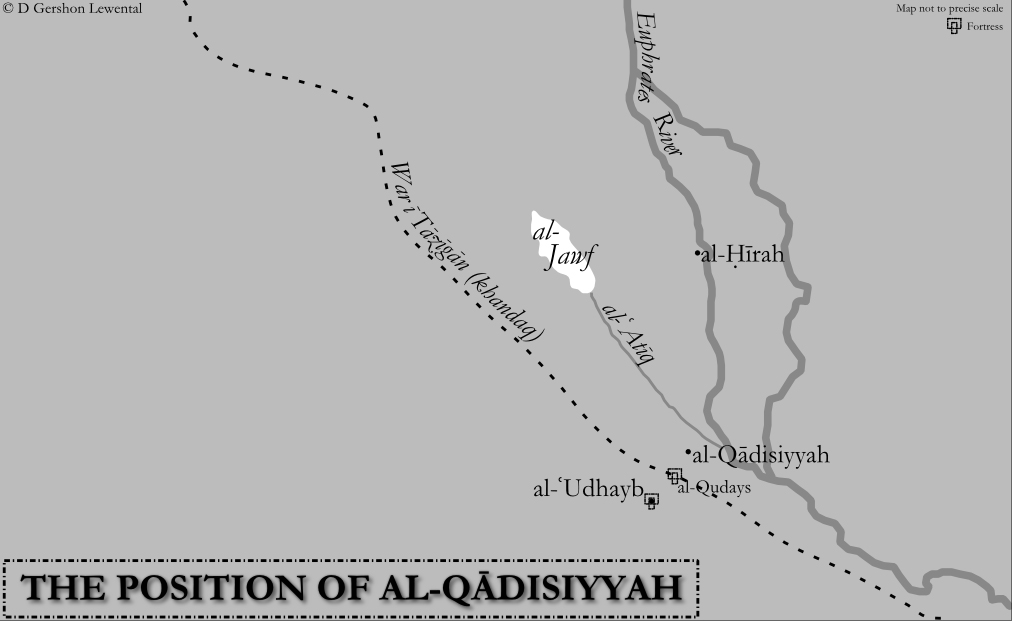Primary sources on the Bajīlah’s ‘fourth’
Overview

Table of contents
3. Ibn Abī Shaybah (775–849)
An Iraqi traditionist and historian, Abū Bakr ʿAbd-Allāh b. Muḥammad b. Ibrāhīm (Abū Shaybah) al-Kūfī (775–al-Kūfah, 849) came from a family of religious scholars and produced several works in the fields of history, law, and religion. His compilation of sayings (Ar. ḥadīth, pl. aḥādīth) was one of the ten canonical collections in the Maghrib. Ibn Abī Shaybah’s Kitāb al-muṣannaf fī al-aḥādīth wa-ʾl-athār (‘The Book arranged by sayings and traditions’) has survived in many manuscripts. (Biography based upon Pellat, III 692.)
3.1 Abū Usāmah←Ismāʿīl [b. Abī Khālid]←Qays [b. Abī Ḥāzim]
[Forthcoming.]
4. al-Balādhurī (d. 892)

4.1 Abū Mikhnaf
… Jarîr ibn-ʿAbdallâh came from as-Sarâh at the head of the Bajîlah tribe, and offered to go to al-ʿIrâḳ, provided one quarter of what they took possession of be allotted to him and his men. ʿUmar accepted the offer and Jarîr started towards al-ʿIrâḳ. …
Source: al-Balādhurī, Expugnationis regionum, 253 (Arabic); English translation from idem, Origins, I 405. (Cf. aṭ-Ṭabari, 4.2.)
4.2 ʿAffān b. Muslim←Hammād b. Salamah←Dāwūd b. Abī Hind←ash-Shaʿbī
After the death of abu-ʿUbaid, who was the first to be directed by ʿUmar to al-Kûfah, ʿUmar directed Jarîr ibn-ʿAbdallâh there, saying, Wouldst thou go to al-ʿIrâḳ if I allow thee one-third of the spoils after the [usual] fifth has been taken?
and Jarîr said, I will
.
Source: al-Balādhurī, Expugnationis regionum, 253 (Arabic); English translation from idem, Origins, I 406.

4.3 Muḥammad b. aṣ-Ṣabbāḥ al-Bazzāz←Hāshim←Ismāʿīl b. Abī Khālid←Qays b. Abī Ḥāzim
The Bajîlah tribe constituted one-fourth of the Moslems in the battle of al-Ḳâdisîyah, and ʿUmar had allotted them one-fourth of as-Sawâd. Once when Jarîr [b. ʿAbd-Allāh] called on ʿUmar, the latter said, Had I not been responsible for what I divide (lawlā innī qāsim al-masʾul), I would leave to you the share already given; but I see that the Muslims have multiplied, so ye have to restore what ye have taken
. Jarîr and the others did as ʿUmar said and ʿUmar offered Jarîr 80 dînârs.
A woman of the tribe of Bajîlah, called umm-Kurz, came to ʿUmar and said, My father died and his share in as-Sawâd holds good. I shall never deliver it!
ʿUmar turned to her and said, But, umm-Kurz, thy people have all consented to do so
. I shall never consent
, said she, unless thou carry me on a submissive she-camel covered with a red nappy mantle (qaṭīfah) and fill both my hands with gold
, which ʿUmar did.
Source: al-Balādhurī, Expugnationis regionum, 267 (Arabic); English translation from idem, Origins, I 424-425. (Cf. Abū Yūsuf, 1.1).
4.4 al-Ḥusayn←Abū Usāmah←Ismāʿīl [b. Abī Khālid]←Qays [b. Abī Ḥāzim]←Jarīr [b. ʿAbd-Allāh al-Bajalī]
ʿUmar gave to the Bajîlah one-quarter of as-Sawâd which they held for three years.
Source: al-Balādhurī, Expugnationis regionum, 267 (Arabic); English translation from idem, Origins, I 425.
4.5 Qays [b. Abī Ḥāzim]
Jarîr ibn-ʿAbdallâh accompanied by ʿAmmâr ibn-Yâsir called on ʿUmar who said, Had I not been held responsible for what I divide, I would leave to you the shares already given, but I see now that ye ought to restore what ye have taken
. And they did, upon which ʿUmar offered a present of 80 dînârs to Jarîr.
Source: al-Balādhurī, Expugnationis regionum, 267-268 (Arabic); English translation from idem, Origins, I 425. (Cf. Yaḥyā b. Ādam, 2.1).
4.6 al-Ḥasan b. ʿUthmān az-Ziyādī←ʿĪsā b. Yūnus←Ismāʿīl [b. Abī Khālid]←Qays [b. Abī Ḥāzim]
ʿUmar gave Jarîr ibn-ʿAbdallāh 400 dînârs.
Source: al-Balādhurī, Expugnationis regionum, 268 (Arabic); English translation from idem, Origins, I 425.
4.7 Ḥumayd b. ar-Rabīʿ←Yaḥyā b. Ādam←al-Ḥasan b. Ṣāliḥ←Ṣāliḥ
ʿUmar gave the Bajîlah, in exchange for the fourth of as-Sawâd they held, a stipend of 2,000 dirhams.
Source: al-Balādhurī, Expugnationis regionum, 268 (Arabic); English translation from idem, Origins, I 425.
4.8 al-Walīd b. Ṣāliḥ←al-Wāqidī←ʿAbd al-Ḥamīd b. Jaʿfar←Jarīr b. Yazīd b. Jarīr b. ʿAbd-Allah←his father (Yazid b. Jarīr b. ʿAbd-Allāh)←his father (Jarīr b. ʿAbd-Allāh)
ʿUmar allotted to Jarîr and his men one-quarter of what they had conquered in as-Sawâd. When the spoils of Jalûlâʾ were brought together, Jarîr demanded his quarter. Saʿd communicated the demand to ʿUmar who wrote back as follows: If Jarîr wants himself considered as having with his men, fought for a pay similar to the pay of al-Muʾallafah Ḳulūbuhum [sic; ‘those whose hearts are won to Islam by special gifts’; Qurʾān 9.60], then you may give them their pay. If, however, they have fought in Allah’s cause and will accept his remuneration, then they are part of the Muslims, having their rights and their obligations
. Hearing that, Jarîr said, Truly and honestly has the
.
Commander of the Believers
spoken, We do not want our quarter
Source: al-Balādhurī, Expugnationis regionum, 268 (Arabic); English translation from idem, Origins, I 425.
Bibliography and further reading
Abū Yūsuf Yaʿqūb b. Ibrāhīm al-Kūfī. Kitāb al-kharāj. 1st edition. Cairo: al-Maṭbaʿah as-Salafiyyah wa-maktabatuhā, 1934.
Abū Yūsuf Yaʿqūb b. Ibrāhīm al-Kūfī. Taxation in Islām. Ed. and transl. from Arabic by Aharon Ben Shemesh. Vol. 3, Abū Yūsuf’s Kitāb al-kharāj. Leiden & London: E J Brill; Luzac, 1969.
al-Balādhurī, Aḥmad b. Yaḥyā. Liber expugnationis regionum. 2nd ed. Ed. Michael Jan de Goeje. 1866. Reprint, Leiden: E J Brill, 1968. [online]
al-Balādhurī, Aḥmad b. Yaḥyā. The Origins of the Islamic state, being a translation from the Arabic accompanied with annotations, geographic and historic notes of the Kitâb futûḥ al-buldân of al-Imâm abu-l ʿAbbâs Aḥmad ibn-Jâbir al-Balâdhuri. Khayats Oriental reprint, 11. Ed. and transl. from Arabic by Philip Khuri Hitti. Vol. 1. 1916. Reprint, Beirut: Khayats, 1966. [online]
Becker, Carl Heinrich. ‘al-Balād̲h̲urī, Aḥmad b. Yaḥyā b. Ḏj̲ābir b. Dāwūd’. In Encyclopædia of Islam. 2nd ed. Leiden: E J Brill, 1960–2005. Vol. 1, 971 (DOI 10.1163/1573-3912_islam_COM_0094).
Bosworth, Clifford Edmund. ‘al-Ṭabarī, Abū Ḏj̲afar Muḥammad b. Ḏj̲arīr b. Yazīd’. In Encyclopædia of Islam. 2nd ed. Leiden: E J Brill, 1960–2005. Vol. 10, 11–15 (DOI 10.1163/1573-3912_islam_COM_1133).
Donner, Fred McGraw. The Early Islamic conquests. Princeton: Princeton University Press, 1981. [online (excerpt)]
Görke, Andreas. ‘Eschatology, history and the common link: A Study in methodology’. In Method and theory in the study of Islamic origins, ed. Herbert Berg, 179–208. Islamic history and civilization: Studies and texts, 49. Leiden/Boston: E J Brill, 2003 (DOI 10.1163/9789047401575_012).
Ibn Abī Shaybah, Abū Bakr ʿAbd-Allāh b. Muḥammad al-Kūfī. Kitāb al-Muṣannaf fī al-aḥādīth wa-ʾl-athār. 15 vols. 1st ed. Riyāḍ: Maktabat ar-Rushd Nāshirūn, 2004/1425.
al-Jaṣṣāṣ, Aḥmad b. ʿAlī Abū Bakr al-Rāzī. Aḥkām al-Qurʾān. 5 vols. Ed. Muḥammad al-Ṣādiq Qamḥawī. Beirut: Dār Iḥyāʾ al-Turāth al-ʿArabiyyah, 1992/1312. [online]
Juynboll, Gautier H A. ‘(Re)appraisal of some technical terms in ḥadīth science’. Islamic Law & Society 8.3 (2001): 303–349 (DOI 10.1163/156851901317230611). [JStor]
Juynboll, Gautier H A. ‘Some isnād-analytical methods illustrated on the basis of several woman-demeaning sayings from ḥadīth literature’. In Ḥadīth: Origins and developments, ed. Harald Motzki, 175–216. The Formation of the classical Islamic world, 28. Aldershot, UK/Burlington: Ashgate/Variorum, 2004.
al-Khaṭīb al-Baghdādī, Abū Bakr Aḥmad b. ʿAlī ash-Shāfiʿī. Taʾrīkh Baghdād. 17 vols. 1st ed. Beirut: Dār al-Gharb al-Islāmī, 2001/1422.
Landau-Tasseron, Ella. ‘Sayf ibn ʿUmar in medieval and modern scholarship’. Der Islam 67.1 (1990): 1–26 (DOI 10.1515/islm.1990.67.1.1).
Lewental, D Gershon. ‘Qādisiyyah, then and now: A Case study of history and memory, religion, and nationalism in Middle Eastern discourse’. PhD dissertation, Department of Near Eastern & Judaic Studies, Brandeis University, 2011. [abstract]
Morony, Michael G. Iraq after the Muslim conquest. 1st ed. 1984. Reprint, Piscataway, New Jersey: Gorgias Press, 2005.
Motzki, Harald. ‘Dating Muslim traditions: A Survey’. Arabica 52.2 (April 2005): 204–253 (10.1163/1570058053640349). [JStor]
Noth, Albrecht, in collaboration with Lawrence Irving Conrad. The Early Arabic historical tradition: A Source-critical study. Studies in late antiquity and early Islam, 3. Translated from German by Michael Bonner. 2nd edition. Princeton: Darwin Press, 1994.
Pellat, Charles. ‘Ibn Abī S̲h̲ayba, Abū Bakr ʿAbd Allāh b. Muḥammad b. Ibrāhīm (= Abū S̲h̲ayba) b. ʿUt̲h̲mān al-ʿAbsī al-Kūfī’. In Encyclopædia of Islam. 2nd ed. Leiden: E J Brill, 1960–2005. Vol. 3, 692 (DOI 10.1163/1573-3912_islam_SIM_3055).
Schacht, Joseph. ‘Abū Yūsuf Yaʿḳūb b. Ibrāhīm al-Anṣārī al-Kūfī’. In Encyclopædia of Islam. 2nd ed. Leiden: E J Brill, 1960–2005. Vol. 1, 164–165 (DOI 10.1163/1573-3912_islam_SIM_0277).
Schmucker, Werner. ‘Yaḥyā b. Ādam b. Sulaymān’. In Encyclopædia of Islam. 2nd ed. Leiden: E J Brill, 1960–2005. Vol. 11, 243–245 (DOI 10.1163/1573-3912_islam_SIM_7948).
Sellheim, Rudolf. ‘al-Ḵh̲aṭīb al-Bag̲h̲dādī, Abū Bakr Aḥmad b. ʿAlī b. T̲h̲ābit b. Aḥmad b. Mahdī al-S̲h̲āfiʿī, known as al-Ḵh̲aṭīb al-Bag̲h̲dādī’. In Encyclopædia of Islam. 2nd ed. Leiden: E J Brill, 1960–2005. Vol. 4, 1111–1112 (DOI 10.1163/1573-3912_islam_SIM_4235).
Spies, Otto. ‘al-Ḏj̲aṣṣāṣ, Aḥmad b. ʿAlī Abū Bakr al-Rāzī’. In Encyclopædia of Islam. 2nd ed. Leiden: E J Brill, 1960–2005. Vol. 2, 486 (DOI 10.1163/1573-3912_islam_SIM_2017).
al-Ṭabarī, Abū Jaʿfar Muḥammad b. Jarīr. Annales quos scripsit Abu Djafar Mohammed ibn Djarir at-Tabari. 15 vols. Ed. Michael Jan de Goeje, Jakob Barth, Theodor Nöldeke, et al. Leiden: E J Brill, 1879–1901. [online (vol. 4)] [online (vol. 5)]
al-Ṭabarī, Abū Jaʿfar Muḥammad b. Jarīr. The History of al-Ṭabarī. Bibliotheca Persica. Transl. from Arabic by Khalid Yahya Blankinship. Vol. 11, The Challenge to the empires: A.D. 633–635/A.H. 12–13. Albany: State University of New York Press, 1993.
al-Ṭabarī, Abū Jaʿfar Muḥammad b. Jarīr. The History of al-Ṭabarī. Bibliotheca Persica. Translated from Arabic by Yohanan Friedmann. Vol. 12, The Battle of al-Qādisiyyah and the conquest of Syria and Palestine: A.D. 635–637/A.H. 14–15. Albany: State University of New York Press, 1992.
Yaḥyā b. Ādam al-Qurashī. Le livre de l’impôt foncier. Ed. Theodoor Willem Jan Juynboll. Leiden: E J Brill, 1896. [online]
Yaḥyā b. Ādam al-Qurashī. Taxation in Islām. Ed. and transl. from Arabic by Aharon Ben Shemesh. Vol. 1, Yaḥyā ben Ādam’s Kitāb al-kharāj. 2nd revised edition. Leiden: E J Brill, 1967.
Related links
Image credits
- al-Baṭḥā, a contemporary settlement in the Sawād, on the banks of the Euphrates River. Source: University of Michigan Museum of Anthropology: Mesopotamian landscapes.
- Map of the strategic position of al-Qādisiyyah. Source: D Gershon Lewental (DGLnotes).
- A Bedouin woman standing with two camels in the western Arabian Peninsula. Source: Encyclopædia Britannica.
